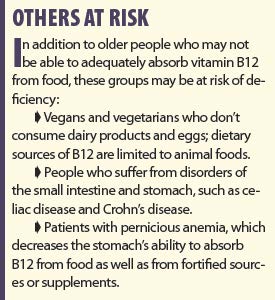Even if youre only a little low in vitamin B12, you might be at greater risk for cognitive decline than previously thought. While prior research has linked serious B12 deficiency to higher likelihood of cognitive problems, a recent Tufts study found that moderately low levels of B12 also put older people at significantly increased risk.
Thinkstock

The study divided participants into five groups based on their blood levels of vitamin B12. Men and women in the second-lowest group did not fare any better in terms of cognitive decline than those with the worst vitamin B12 blood levels, reports Martha Savaria Morris, PhD, a scientist in Tufts HNRCA Nutritional Epidemiology Laboratory and lead author of the study.
LOW B12 AND DECLINE: Morris and colleagues analyzed data on 549 men and women, average age 75, participating in the Framingham Heart Study, whose blood levels of B12 were measured. Over an eight-year period, cognitive ability was evaluated using a standard test called the Mini-Mental State Examination (MMSE). Overall, MMSE scores declined slightly-0.24 points per year-during this follow-up period. But average declines were significantly faster in both the lowest and second-lowest groups ranked by vitamin B12 status.
While we emphasize our study does not show causation, our associations raise the concern that some cognitive decline may be the result of inadequate vitamin B12 in older adults, for whom maintaining normal blood levels can be a challenge, says Paul F. Jacques, DSc, director of the laboratory and senior author of the study, which was published in the Journal of the American Geriatrics Society.
WHOS AT RISK: The B12 challenge for older adults is due to the common development of a condition called atrophic gastritis (loss of stomach-acid secretion) with aging. This often makes it more difficult for older people to benefit from the vitamin B12 that naturally occurs in foods, where the vitamin is bound to protein. Vitamin B12 in food must be released by acids in the stomach before it can be used by the body.

The synthetic vitamin B12 used in fortified foods and vitamin supplements comes in a crystalline formation thats much more readily absorbed and used than the naturally occurring form.
Even if youre not among the estimated 10% to 30% of older adults with atrophic gastritis, you could still be at risk for B12 deficiency. Proton-pump inhibitor drugs, used to treat indigestion or reflux, work by shutting off gastric acids. Alternate anti-heartburn medications called H2 receptor agonists can also interfere with B12 absorption.
WHAT TO DO: The Institute of Medicine (IOM) and the Dietary Guidelines for Americans recommend that adults older than age 50 rely on vitamin B12-fortified foods and supplements (multivitamins or single supplements) to avoid deficiency. The Recommended Dietary Allowance (RDA) for both men and women ages 14 and up is 2.4 micrograms. Note, however, that the Daily Value that may be used on food labels for B12 is higher, 6.0 micrograms; 40% of the DV would equal the RDA. Nutrition Facts labels do not have to list vitamin B12 unless a food has been fortified with the vitamin.
Without blood tests, theres no way to know for sure if youre getting enough vitamin B12 from the food you eat. You may not need supplements, however. One bowl of fortified cereal-check the label to make sure-can provide all the B12 most people over 50 need in a day.
To learn more, see our July 2011 Special Report on vitamin B12.
























